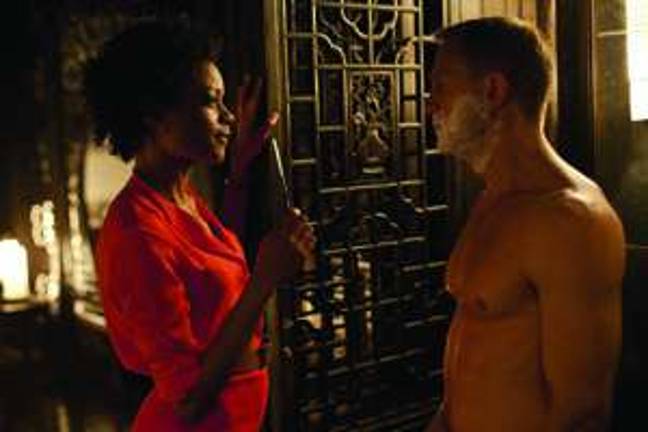On His Majesty's Secret Service: 007's "Skyfall" Goes Sky-High

Agent 007 James Bond (Daniel Craig) returns to his roots in Skyfall, defending the MI6 agency to which he's always had steadfast dedication, even while gallantly enjoying its bachelor benefits. On home turf, Bond restores all of us to our pop culture roots; Skyfall's national security plot, combining an arch villain's (Javier Bardem) threats to Q (Judi Dench), then breaching Bond's ancestral residence, carries affectionate-even cultural-resonance. The sense of adventure is stabilizing and feels good. Skyfall's success isn't a surprise. It should probably be the first Bond film to win a Best Picture Oscar-not because it's the best (Goldfinger and On Her Majesty's Secret Service are still the series' high points)-but because Skyfall maintains quality popular filmmaking in an era that's lost sight of what that means. Exactly what it means can be seen in the fascinating promotional documentary Everything Or Nothing, which details the history of the James Bond franchise from its inception as a Cold War spy novel by British journalist Ian Fleming then adapted by Harry Saltzman and Albert Broccoli, intrepid American film producers who shared the dream of a popular entertainment featuring manly daring, sexual suavity and a subtle sense of political purpose. That this Anglo-American commercial enterprise would result in a 50-year globally admired venture that morphs yet without changing speaks to the marvel of the West's pop culture dominance. That dominance is at stake in Skyfall's plot involving a Wikileaks-style enemy whose nefarious personal crusade and terrorist attack on MI6 heralds a new breed of international threat. (Javier Bardem is spectacular in this role; superior to his performance in No Country For Old Men.) Sizing up her enemies, Q says, "They're not nations, they're individuals"-which was also true for the old Bond villains but now takes on the modern sense of social chaos that was unconscionably exploited in Chris Nolan's Batman movies. But Skyfall avoids nihilism by hewing to a code of valor that extends from Fleming to Saltzman and Broccoli. That code never changes despite having six other faces on its brand. As Everything Or Nothing shows, each Bond actor lent his own personal integrity. Daniel Craig follows that tradition. His brutalized face and cold eyes personify our acceptance of killing more than Connery's camp glamour and sophistication. Yet, after the spectacular opening stunt, Craig bounds into a moving train and snaps his tuxedo cuffs with terrific élan. Bond's urbanity bests the Dark Knight's affluent yet sophomoric pessimism; the world is in safe hands-as is the idea of entertainment. Most movie chases are alike, and the Bond movies have set the standard for all action thrillers-Road Warrior, Indiana Jones and even the Transporter flicks are just a few that display the Bond influence. The level of stylistic commitment in the Bond films is reassuring. It takes an ace team (including producer Barbara Broccoli), because director Sam Mendes (American Beauty, Road to Perdition) knows nothing about this kind of cinema. Joe Wright's Hanna showed genuine style, and Luc Besson and his cadre have revolutionized action tropes, quickening their purpose, while Skyfall clicks efficiently. The opening escapade introduces a Bond-girl sidekick (Naomie Harris), which enriches what would be routine; that humane flourish sets the tone for Mendes' foray into genre. It might have gone badly-imagine Mike Nichols pinch-hitting an Indiana Jones film. But Skyfall features more character nuances than Craig's previous Bond movies: Harris' role, along with vivid participation from Judi Dench, Ralph Fiennes, Albert Finney, Ben Wishaw and Bardem display Mendes' striking interest in actors. Mendes is lucky. Skyfall is his first film on home turf, and he knows how these people talk and how they relate to the environs of metropolitan London (including a brief stint among the J.M.W. Turners at the Tate Museum) and the Scottish countryside. It adds to the story's personal feel. These well-tailored Tories fighting an internal security breach and "a war we can't understand and can't possibly win" sounds sufficiently post-9/11, which makes Skyfall a modern version of the British WWII homefront movie Went the Day Well? as much as a Bond installment. When Bond escorts Q in the fabled Aston Martin, Skyfall also carries us back to the past-our pop culture past where entertainment wasn't merely frivolous. Skyfall plays with heritage and personal homeland defense but those ideas are no richer than Mission: Impossible: Ghost Protocol. Fortunately, the movie looks terrific. Roger Deakins photographs a silhouetted assassin brawl in a skyscraper and a sequence of red-gold pagodas at night like Robert Burks did It Takes a Thief-for sheer splendor. In Everything Or Nothing, Fleming's first book is referred to as "the autobiography of a dream." This speaks to how the Bond film series epitomized desire and satisfaction. As an expression of Western hegemony, the series isn't just commercial; its good work translates to all territories. In the real world, espionage ain't pretty, but when James Bond wins, it's a global victory. Follow Armond White on Twitter at [3xchair](https://twitter.com/3xchair)